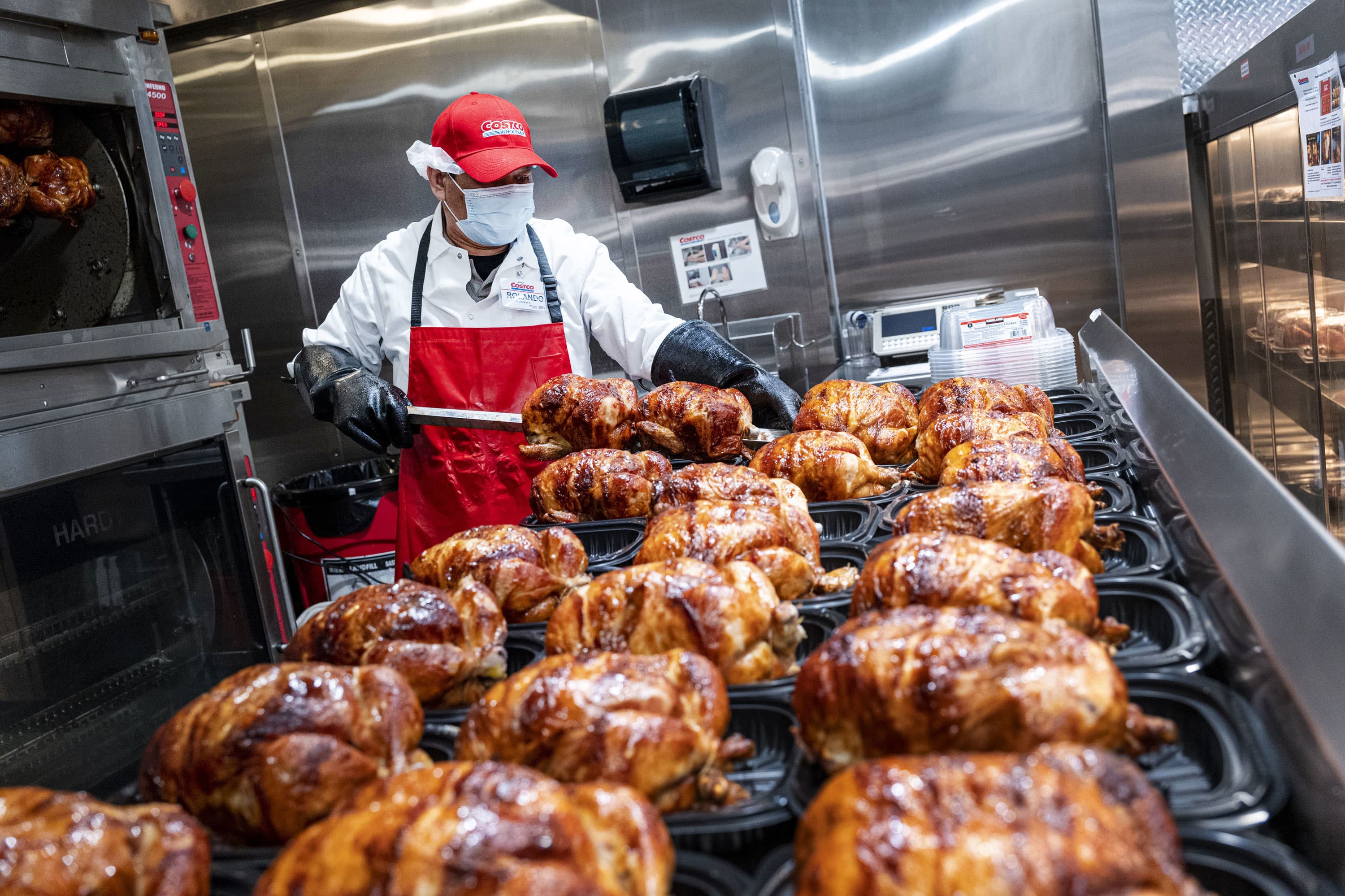A worker wearing a protective mask removes rotisserie chicken from skewers inside a Costco store in San Francisco, California, on Wednesday, March 3, 2021.
David Paul Morris | Bloomberg | Getty Images
Shipping bottlenecks that have led to rising freight costs are cooking up a holiday headache for U.S. retailers.
Costco this week joined the long list of retailers sounding the alarm about escalating shipping prices and the accompanying supply chain issues. The warehouse retailer, which had a similar cautionary tone in May, was joined by athletic wear giant Nike and economic bellwethers FedEx and General Mills in discussing similar concerns.
The cost to ship containers overseas has soared in recent months. Getting a 40-foot container from Shanghai to New York cost about $2,000 a year and a half ago, just before the Covid pandemic. Now, it runs some $16,000, according to Bank of America.
In a conference call Thursday with analysts, Costco Chief Financial Officer Richard Galanti called freight costs “permanent inflationary items” and said those increases are combining with things that are “somewhat permanent” to drive up pressure. They include not only freight but also higher labor costs, rising demand for transportation and products, plus shortages in computer chips, oils and chemicals and higher commodity prices.
“We can’t hold on to all those,” Galanti said. “Some of that has to be passed on, and it is being passed on. We’re pragmatic about it.”
Quantifying the situation, he said inflation is likely to run between 3.5% and 4.5% broadly for Costco. He noted that paper products have seen cost increases of 4% to 8% and he cited shortages of plastic and pet products that are driving up prices from 5% to 11%.
“We can hold the line on some of those things and do a little better job — hopefully do a better job than some of our competitors have and be even that more extreme than the value,” Galanti said. “So I think all those things so far, at least despite the challenges, have worked in our favor a little bit.”
Getting ready for the holidays
The timing, though, is not good.
Persistent inflationary pressures come at a time when retailers are preparing for the holiday shopping season – Halloween, Thanksgiving and Christmas, then into the new year. The pandemic has brought with it a relentless slew of factors that has made inflation an economic buzzword after a generation of mostly moderate price pressures.
Companies are pressed to deal with the situation ahead of a critical period.
“Getting closer to the holidays, we have been working with retailers and what we see is, No. 1, they’ve got to be flexible with their supply chain,” said Keith Jelinek, managing director of the global retail practice at consulting firm Berkeley Research Group. “We’ve seen cost-of-good increases especially in apparel, also costs of inbound shipping with the costs of containers, increases with transportation, trucking to get into distribution centers.”
“All these costs are going to hit the operating profits,” he added. “Retailers right now are really challenged with how much can I pass onto the consumer vs. can I get other efficiencies out of my operations in order to hit my total margin.”
Many companies have indicated that consumers at least for now are willing to take on higher prices. Trillions in government stimulus during the pandemic have helped swell personal wealth, with household net worth up 4.3% in the second quarter.
In the company’s earnings call Thursday, Nike CFO Matthew Friend made references to second-half price increases as well as “stronger than expected full price realization” and “additional transportation, logistics and airfreight costs to move inventory in this dynamic environment.”
No one knows how long consumers will be willing to pay higher prices. Jelinek said he expects the current situation to persist into at least through the holiday season and into the early part of next year
“There’s only so much you can pass on to the consumer,” he said. “What most retailers are doing is looking across their [profit and loss statements] and they’re looking to improve performance and to optimize efficiency. That means really focusing on their supply chain.”
It also means raising prices.
Company warnings
FedEx this week announced that it will hike shipping rates 5.9% for domestic services and 7.9% for other offerings. The company said it is being hit by labor shortages and “costs associated with the challenging operating environment.”
The head of the company’s chief competitor acknowledged the hurdles the business faces.
“The labor market is tight, and in certain parts of the country we’ve had to make some market-rate adjustments to react to the demands of the market,” UPS CEO Carol Tome said Thursday on CNBC’s “Closing Bell.”
She added that the company also has been hit by supply chain issues.
“I’m afraid this is going to last for a while. These issues have been a long time coming and it’s going to take all of us working together to clear those blockages,” Tome said.
Federal Reserve officials this week conceded that inflation will be higher in 2021 than they had anticipated. However, they still see prices settling to a more normal range just above 2% in the coming years.
But Cleveland Fed President Loretta Mester said in a speech Friday that she sees “upside risks” to the central bank’s inflation forecasts.
“Many businesses report that cost pressures are intensifying and consumers seem to be willing to pay higher prices,” she said. “The combination of strong demand and supply chain challenges could last longer than I anticipate and could lead people and businesses to raise their expectations for future inflation more than we have seen so far.”
Fed officials said they are ready to start pulling back on the monetary stimulus they’ve provided during the pandemic but probably won’t be raising rates soon. However, Mester said that should prices and expectations hold higher, Fed policy “would need to be adjusted” to control inflation.
Become a smarter investor with CNBC Pro.
Get stock picks, analyst calls, exclusive interviews and access to CNBC TV.
Sign up to start a free trial today.



